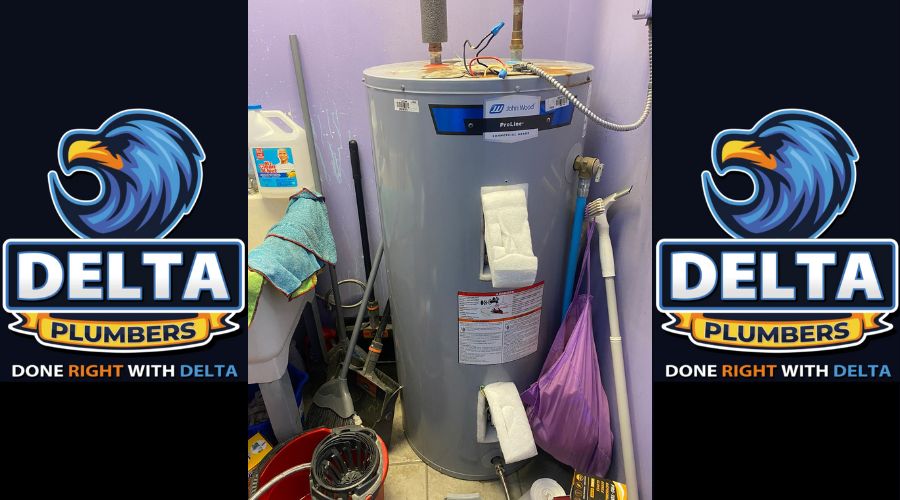A leaking water heater can lead to various issues, ranging from water damage to inefficiencies in heating. As a homeowner, it’s crucial to understand the underlying causes, potential fixes, and when professional help is necessary. At Delta Plumbers, we’ve seen it all when it comes to leaking water heaters, and this guide will walk you through everything you need to know to identify and repair your leaking water heater.

Picture Source – Delta Plumbers
Can a Leaking Water Heater Be Fixed?
In most cases, a leaking water heater can be repaired, but the solution depends on where the leak originates. Some common causes of water heater leaks include a malfunctioning pressure relief valve, a worn-out drain valve, or corroded water lines. If these components are the source of the issue, the repair is usually straightforward.
However, if the tank itself is leaking, that’s a more significant problem. Unfortunately, a leaking tank usually indicates internal corrosion or structural damage, and repairs are rarely an option in this case. Typically, if the leak is due to a corroded tank, the best course of action is to replace the water heater entirely.
At Delta Plumbers, we recommend addressing water heater leaks as soon as they are noticed to avoid further complications. Even minor leaks can lead to water damage, mold growth, or inefficiencies in your heating system.
Also Read: Benefits of Installing a Water Softener

Picture Source – Delta Plumbers
What Causes a Water Heater to Leak from the Bottom?
A water heater leaking from the bottom can result from various factors, and it’s essential to pinpoint the cause to prevent further damage. Common reasons for water heater leaks from the bottom include:
1. Drain Valve Issues
The drain valve, located near the base of the water heater, is responsible for emptying the tank during maintenance or when flushing the system. Over time, this valve may loosen or become faulty, causing leaks from the bottom of the tank. In many cases, simply tightening or replacing the valve can resolve the issue.
2. Excessive Sediment Buildup
Water heaters naturally accumulate sediment, such as minerals and debris, from the water supply. If the sediment buildup becomes too extensive, it can damage the bottom of the tank, leading to leaks. Regular flushing of the water heater can prevent this issue, but if the bottom has already corroded due to sediment, replacement may be necessary.
3. Faulty Temperature and Pressure Relief (T&P) Valve
The T&P valve is designed to release water if the pressure or temperature inside the tank becomes too high. If this valve malfunctions, water may be released from the bottom of the tank, creating the appearance of a leak. This problem often requires valve replacement to ensure safety and proper function.
4. Corrosion in the Tank
Over time, the inside of a water heater tank may corrode due to rust or mineral deposits, weakening the tank’s structure. This corrosion can create small holes, which eventually lead to leaks. Unfortunately, a corroded tank cannot be repaired, and replacement is the only viable solution.
Also Read: How to Install New Kitchen Faucet: Delta Plumbers

Picture Source – Delta Plumbers
Is It Safe to Leave a Leaking Water Heater On?
No, it is not safe to leave a leaking water heater on. A leaking water heater can lead to several safety hazards and long-term damage if not addressed promptly. Here’s why you should always turn off a leaking water heater:
1. Risk of Electrical Hazards
If you have an electric water heater and it’s leaking, water can seep into electrical components, increasing the risk of a short circuit or even an electrical fire. To prevent this, it’s essential to turn off the water heater at the breaker panel and disconnect any electrical connections immediately.
2. Water Damage
Even a small leak can result in significant water damage to your floors, walls, and any items stored near the water heater. Prolonged leaks can lead to mold growth, structural damage, and higher repair costs.
3. Possible Explosions or Scalding
If the T&P valve fails, pressure can build up inside the tank, increasing the risk of an explosion. While this is a rare occurrence, it is a serious risk, especially in older water heaters. Turning off the water heater can help avoid this potentially dangerous situation.
In summary, if your water heater is leaking, turn off the power and the water supply to the heater immediately, and call Delta Plumbers for a professional inspection and repair.
Also Read: Advantages of Using PEX Piping in Plumbing

Picture Source – Delta Plumbers
How Can I Tell Where My Water Heater Is Leaking From?
Identifying the exact location of a water heater leak can help you understand whether the issue can be repaired or if the water heater needs to be replaced. Follow these steps to locate the source of the leak:
1. Inspect the Connections
Check all connections, including the cold and hot water inlet and outlet pipes, the T&P valve, and the drain valve. Loose or damaged connections are common sources of leaks.
2. Check the T&P Valve
If water is leaking from the T&P valve (typically located on the side or top of the tank), it may be due to excessive pressure in the tank or a faulty valve. Test the valve by lifting the lever slightly to release some water. If the valve continues to leak after this test, it will likely need replacement.
3. Look for Leaks at the Bottom
If water is pooling at the bottom of the tank, it could be due to a drain valve issue or sediment buildup. In some cases, water leaking from the top may travel down the sides of the tank and collect at the bottom, so be sure to check the entire unit.
4. Inspect the Tank for Corrosion
Rust or corrosion on the tank itself is a strong indicator that the tank is compromised. If you see rust-colored water around the heater or notice the tank is rusting, the leak is likely from internal corrosion.
If you’re unable to determine the source of the leak, contact Delta Plumbers for a professional evaluation. Our experts can accurately diagnose the problem and recommend the best course of action.
Also Read: Benefits of Regular Drain Cleaning

Picture Source – Delta Plumbers
Is a Water Heater Leaking from the Bottom an Emergency?
A water heater leaking from the bottom is a serious issue, and in many cases, it can be considered an emergency. Here are some reasons why:
1. Potential for Flooding
Even a small leak from the bottom of the water heater can escalate into a more significant issue, potentially flooding your home and causing extensive water damage. If you notice water pooling around your water heater, it’s essential to act quickly to prevent further damage.
2. Damage to the Water Heater
A leak from the bottom of the tank can indicate internal damage, such as corrosion or a crack in the tank. If the leak is not addressed promptly, the water heater could fail entirely, resulting in more costly repairs or replacements.
3. Risk of Mold and Mildew
Water leaks that go untreated for an extended period can lead to the growth of mold and mildew in your home. Mold can cause health issues, especially for individuals with allergies or respiratory problems, and removing mold is often an expensive process.
If your water heater is leaking from the bottom, turn off the water supply to the heater and the power source, then contact Delta Plumbers for emergency assistance.
Also Read: How to Detect and Fix Silent Toilet Leaks

Picture Source – Delta Plumbers
How Long Will a Hot Water Heater Last Once It Starts Leaking?
Once a water heater begins to leak, its remaining lifespan is usually quite limited, especially if the leak originates from the tank itself. Several factors determine how long a water heater will last after a leak starts:
1. Cause of the Leak
If the leak is due to a faulty valve or connection, the water heater may continue to function normally after repairs. However, if the tank is leaking due to internal corrosion or a crack, the unit is likely nearing the end of its life and will need to be replaced soon.
2. Size of the Leak
A small, slow leak may allow the water heater to operate for a short time, but the issue will likely worsen over time. Larger leaks indicate more significant damage and typically signal that the water heater is in immediate need of replacement.
3. Age of the Water Heater
The age of your water heater plays a significant role in how long it will last after a leak begins. If your unit is nearing the end of its expected lifespan (typically 8-12 years for most units), a leak often signals the need for a replacement. Newer units may have more repair options available, depending on the cause of the leak.
At Delta Plumbers, we recommend replacing your water heater as soon as it starts to leak, especially if the leak is from the tank. Continuing to use a leaking unit can result in water damage, higher energy bills, and potential safety hazards.
Also Read: Home’s Water Pressure: How to Improve by Delta Plumbers

Picture Source – Delta Plumbers
What Is the Life Expectancy of a Water Heater?
The typical lifespan of a water heater is between 8 and 12 years, though this can vary depending on factors such as the type of water heater, the quality of installation, and how well it has been maintained. Here are some general guidelines:
1. Traditional Tank Water Heaters
Most traditional water heaters with tanks last between 8 and 12 years. With proper maintenance, including regular flushing to remove sediment buildup, some units can last even longer.
2. Tankless Water Heaters
Tankless water heaters generally have a longer lifespan than traditional models, often lasting 15-20 years or more. Because these units don’t store water, they’re less prone to issues like sediment buildup and corrosion.
3. Maintenance and Care
Regular maintenance can significantly extend the life of your water heater. Flushing the tank annually, checking the anode rod, and ensuring the T&P valve functions properly are all key to keeping your water heater in good working order.
At Delta Plumbers, we offer maintenance services to help you get the most out of your water heater. By addressing small issues before they become major problems, you can ensure your unit lasts as long as possible.
Conclusion
A leaking water heater is a common problem that can quickly escalate into a more severe issue if not addressed promptly. While some leaks are easy to repair, others may signal the need for a replacement. By understanding the causes of water heater leaks, taking swift action, and performing regular maintenance, you can extend the lifespan of your water heater and avoid costly damage.
If you have a leaking water heater and need professional help, don’t hesitate to contact Delta Plumbers. Our experienced technicians are here to diagnose the problem, provide expert advice, and ensure your water heater is back in working order as quickly as possible.









